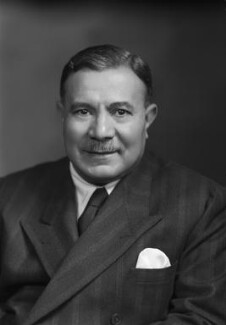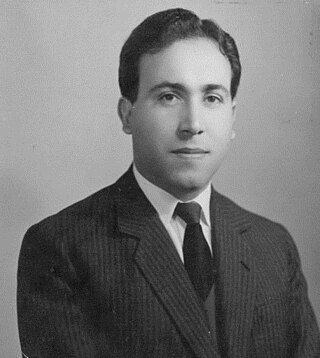Related Research Articles
"Arḍ ul-Furātayn", also known as the "Land of The Two Rivers", "Ardulfurataini Watan" or "Ardulfurataini", was the national anthem of Iraq from 1981 to 2003, during the Ba'athist regime of Saddam Hussein.

Khairallah Talfah, also known as Khayr-Allah Telfah, Kairallah Tolfah, Khairallah Tolfah, or Khairallah Tilfah, was an Iraqi Ba'ath Party official, and the maternal uncle and father-in-law of Saddam Hussein. He was the father of Sajida Talfah, Saddam's first wife, and of Adnan Khairallah, defence minister. Saddam appointed Khairallah Talfah mayor of Baghdad, but he was forced to remove Khairallah from office due to corruption.

Iraq has had three vice presidents or deputy presidents serving concurrently.

Adnan Khairallah was an Iraqi military officer and Saddam Hussein's brother-in-law and cousin. He held several titles and was a member of the Iraqi Revolutionary Command Council. He also served as the Defence Minister of Iraq from 1979 until his death, being appointed days after Saddam Hussein succeeded to the Presidency.

Edmund Ghareeb is a Lebanese-American scholar at the American University in Washington and a professor at George Washington University's Elliott School of International Affairs. He earned a BA from the American International College and an MA and a PhD from Georgetown University.

Sayyid Salih Jabr was an Iraqi statesman who served as the prime minister of Iraq from March 1947 to January 1948. He was the first Shi'ite to become prime minister.
Al-Muthanna ibn Haritha al-Shaybani was a Muslim Arab general in the army of the Rashidun Caliphate.
The National Union Front was an Iraqi nationalist political alliance formed in 1954 and re-established in 1956 as a coalition of the Ba'ath Party, the Iraqi Communist Party, the Iraqi Independence Party, the National Democratic Party and later the Kurdistan Democratic Party. The alliance supported various Arab nationalist and liberation movements around the world, supporting the governments in Egypt and Syria and supporting the Algerian liberation movement. The party splintered and dissolved in the aftermath of the 1958 revolution led by Abd al-Karim Qasim after division across between Arab nationalists and Iraqi communists.

The Arab Socialist Ba'ath Party – Iraq Region, officially the Iraqi Regional Branch, is an Iraqi Ba'athist political party founded in 1951 by Fuad al-Rikabi. It was the Iraqi regional branch of the original Ba'ath Party, before changing its allegiance to the Iraqi-dominated Ba'ath movement following the 1966 split within the original party. The party was officially banned following the American invasion of Iraq in 2003, but despite this it still continues to function underground.

Fuad al-Rikabi was an Iraqi politician and a founder of the Iraqi Regional Branch of the Arab Socialist Ba'ath Party. Al-Rikabi became the Secretary of Iraqi Regional Command of the Ba'ath Party in 1954 and held the post until 1959. Throughout his term of leadership, the Iraqi Regional Branch expanded its membership and became a leading party in Iraq's political landscape. Following the 14 July Revolution of 1958 which toppled the monarchy, al-Rikabi was appointed Minister of Development in Abd al-Karim Qasim's unity government.
Abdullah Sallum al-Samarra'i was an Iraqi Ba'athist politician and leading member of the Arab Socialist Ba'ath Party in Iraq. He was a member of the Regional Command from 1964 to 1970, when he was expelled.

Abd al-Khaliq al-Samarra'i was an Iraqi Ba'athist politician and leading member of the Arab Socialist Ba'ath Party in Iraq. He was a member of the Regional Command from 1964 to 1973, and considered a serious rival of Saddam Hussein for leadership of the civilian faction of the Ba'ath Party. He was arrested in 1973 for his alleged involvement in a plot to overthrow the government, and executed in 1979 by Hussein.

The Regional Command of the Arab Socialist Ba'ath Party – Iraq Region, officially the Regional Command of the Iraqi Regional Branch of the Arab Socialist Ba'ath Party, was the highest decision-making organ of the Ba'ath Party organization in Iraq. The Regional Command has normally had 19-21 members throughout its history. When in power, the Directorate of Security Affairs was responsible for the security of the president and the senior members of the Regional Command.
Salih Mahdi Ammash was an Iraqi historian, writer, author, poet and Iraqi Regional Branch politician and Iraqi army officer who sat on the Regional Command from 1963 to 1971.
Muthaffar al-Nawab or Muzaffar al-Nawwab was an Iraqi poet and political critic.
The Iraqi Intifada was a series of national strikes and violent protests against the ruling Hashemite monarchy and the Anglo-Iraqi Treaty. Inspired by the Egyptian Revolution and Iranian Prime Minister Mohammad Mosaddegh's nationalization of oil, the revolutionaries wanted to force Faisal II's abdication, transform the state into a republic, and assert Iraq's full independence from Britain by assuming control over its own foreign affairs.
Mishkat Al-Moumin is an Iraqi lawyer and lecturer. She served as the Minister of Environment in the Iraqi Interim Government under Iyad Allawi (2004–05). After surviving several assassination attempts due to her advocacy for women's rights, she moved to the United States.
The Senate of Iraq was the unelected upper house of the bicameral parliament established by the Mandatory Iraq's 1925 constitution. There were around twenty Senators, appointed for eight years by the King of Iraq. The Senate remained in existence until the 1958 revolution.
Mawlud Mukhlis, born in Mosul in 1886 and died in Beirut, Lebanon in 1951, was an Arab nationalist, soldier and Iraqi politician. He headed the Chamber of Deputies of Iraq from December 1937 to November 1941.
Saadoun Ghaidan is an Iraqi politician and military with the rank of Major General and was a member of the Arab Socialist Ba'ath Party, a member of the Revolutionary Command Council and held various ministerial positions in the Iraqi government, such as the Minister of Interior and Minister of Transportation.
References
General
Membership of the Revolutionary Command Council was taken from this source:
- Ghareeb & Dougherty 2004 , pp. 385–386
Specific
Bibliography
- Ghareeb, Edmund; Dougherty, Beth (2004). Historical dictionary of Iraq . Scarecrow Press. ISBN 978-0-8108-4330-1.